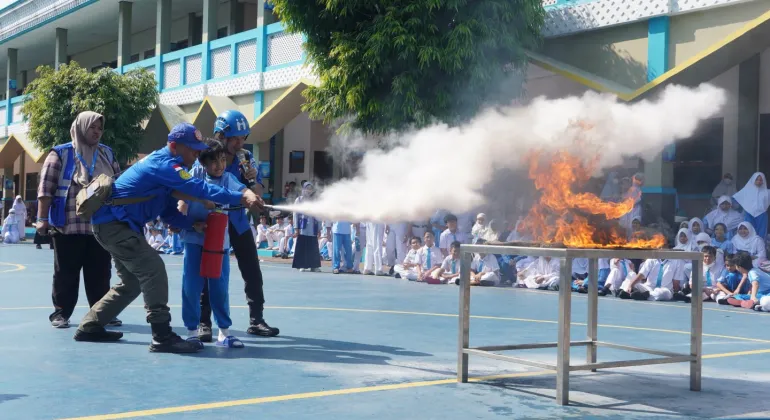News

Training on Disaster Preparedness - Global Islamic School x Human Initiative
Global Islamic School in collaboration with Human Initiative. Combining education and disaster preparedness is essential in building resilient communities and ensuring the safety and well-being of people during emergencies. Here's a general outline of what such a program might entail:
Curriculum Integration: Integrate disaster preparedness education into the school's regular curriculum. This can be done by incorporating relevant topics into various subjects, such as science (natural disasters), geography (mapping hazards), and social studies (community response to disasters).
Specialized Training: Organize workshops and training sessions for both students and staff on disaster preparedness, response, and recovery. Workshops can include first aid training, evacuation drills, and how to respond to specific types of disasters.
Community Engagement: Involve the local community in disaster preparedness efforts. Encourage students to conduct outreach programs to raise awareness and educate their families and neighbors about disaster preparedness measures.
Partnerships: Collaborate with local and international organizations, government agencies, and NGOs that specialize in disaster preparedness and response. These partnerships can provide valuable resources, expertise, and support.
Crisis Communication: Teach students and staff effective communication strategies during emergencies. This includes how to disseminate information, the use of technology for communication during disasters, and the importance of staying connected.
Emergency Response Plan: Develop an emergency response plan for the school. This plan should include evacuation routes, designated assembly areas, and roles and responsibilities for staff and students during emergencies.
Drills and Simulations: Conduct regular drills and simulations to test the effectiveness of the preparedness plan. This helps in identifying potential gaps and areas for improvement.
Psychological Support: Recognize the importance of psychological first aid and provide guidance on how to support individuals who may experience trauma during and after a disaster.
Resilience Building: Teach students the importance of resilience and adaptability in the face of challenges. Discuss how communities can recover and rebuild after a disaster.
Awareness Campaigns: Organize awareness campaigns during disaster preparedness months or important occasions to highlight the significance of being prepared.
Incorporate Islamic Teachings: Integrate Islamic teachings and values that promote compassion, empathy, and helping others during disasters.
Remember that the success of such a program relies on sustained commitment and participation from the school, its students, staff, and the wider community. By implementing a well-rounded disaster preparedness program, the Global Islamic School can contribute significantly to building a safer and more resilient community.
Curriculum Integration: Integrate disaster preparedness education into the school's regular curriculum. This can be done by incorporating relevant topics into various subjects, such as science (natural disasters), geography (mapping hazards), and social studies (community response to disasters).
Specialized Training: Organize workshops and training sessions for both students and staff on disaster preparedness, response, and recovery. Workshops can include first aid training, evacuation drills, and how to respond to specific types of disasters.
Community Engagement: Involve the local community in disaster preparedness efforts. Encourage students to conduct outreach programs to raise awareness and educate their families and neighbors about disaster preparedness measures.
Partnerships: Collaborate with local and international organizations, government agencies, and NGOs that specialize in disaster preparedness and response. These partnerships can provide valuable resources, expertise, and support.
Crisis Communication: Teach students and staff effective communication strategies during emergencies. This includes how to disseminate information, the use of technology for communication during disasters, and the importance of staying connected.
Emergency Response Plan: Develop an emergency response plan for the school. This plan should include evacuation routes, designated assembly areas, and roles and responsibilities for staff and students during emergencies.
Drills and Simulations: Conduct regular drills and simulations to test the effectiveness of the preparedness plan. This helps in identifying potential gaps and areas for improvement.
Psychological Support: Recognize the importance of psychological first aid and provide guidance on how to support individuals who may experience trauma during and after a disaster.
Resilience Building: Teach students the importance of resilience and adaptability in the face of challenges. Discuss how communities can recover and rebuild after a disaster.
Awareness Campaigns: Organize awareness campaigns during disaster preparedness months or important occasions to highlight the significance of being prepared.
Incorporate Islamic Teachings: Integrate Islamic teachings and values that promote compassion, empathy, and helping others during disasters.
Remember that the success of such a program relies on sustained commitment and participation from the school, its students, staff, and the wider community. By implementing a well-rounded disaster preparedness program, the Global Islamic School can contribute significantly to building a safer and more resilient community.






